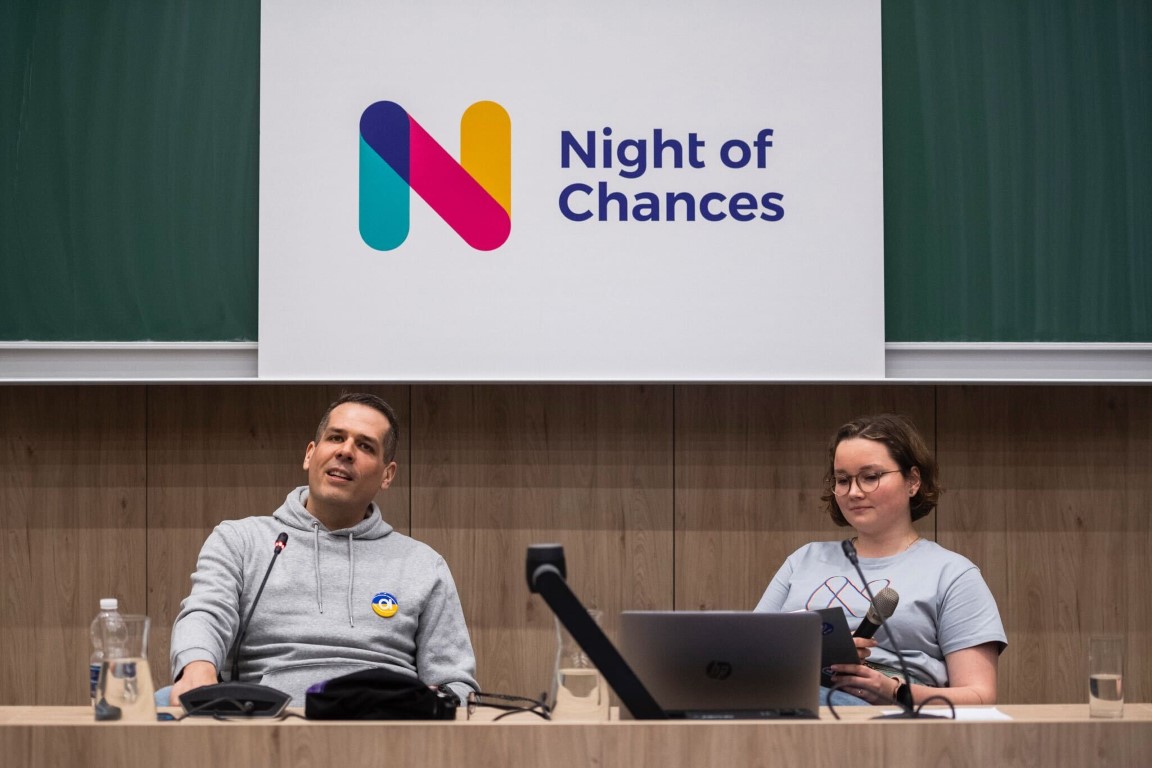First of all, the name “Night of Chances” is pretty fitting, because the students and I took the discussion late into the night, until midnight. A lot of different types of enterprises were there, such as banks, telcos, startups, as well as scale-ups like Ataccama. These companies were not just offering jobs or internships, but also discussing important topics like diversity, inclusion, tolerance for Ukraine, and more. The companies were promoting the idea of having students work for them during internships or full-time jobs, and the event was well-moderated, with only verified, fair companies allowed to attend. It didn't matter how much money you had for hiring, advertisement, or brand building; the focus was on selecting the right parties. Corporations that had business with Russia or had intolerant branding or offering practices were excluded. The seminar took place at a university and several thousand people attended, including Ataccama, whose topic was about bringing data to everybody.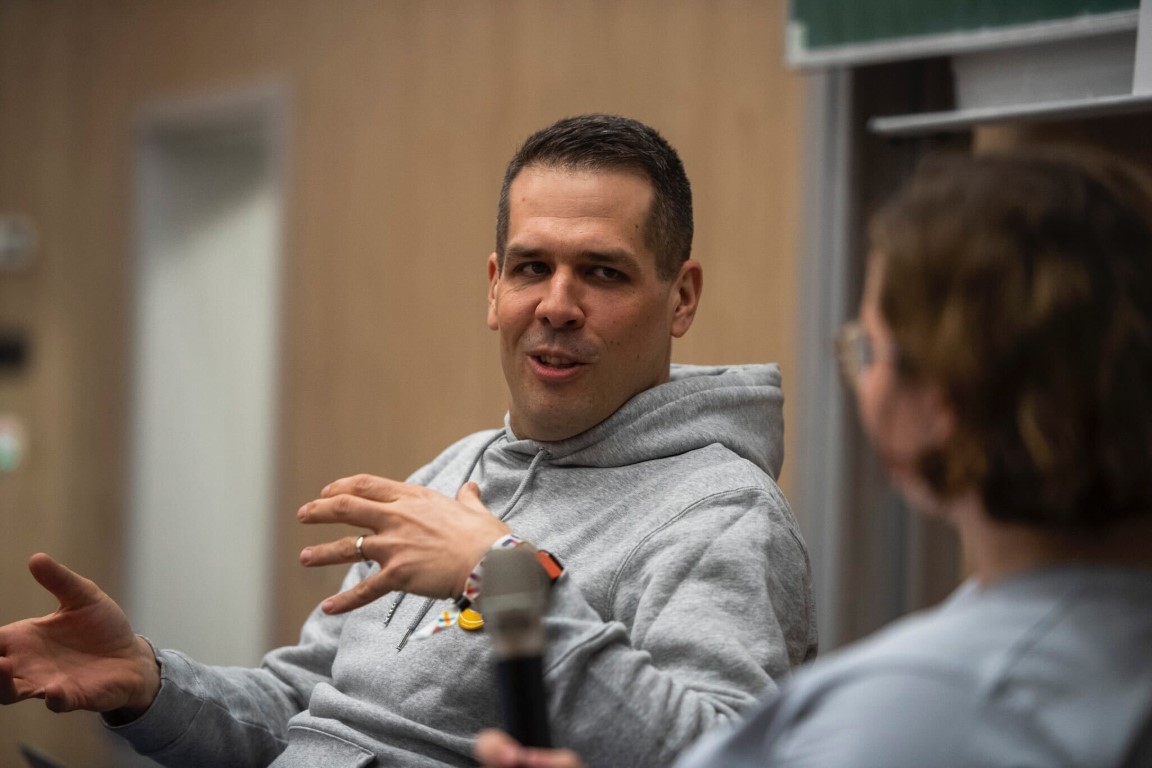
But what does that mean, exactly? Well, Ataccama believes in creating inclusive products that are accessible to all, even those who may not be familiar with data. For example, imagine the head of a museum or a national museum who needs to understand whether it makes sense to be open on the first day, until late at night. This person may not be a data engineer and may not have access to data, or even know where to find it. But they need to answer that question because it's important. Ataccama aims to explain this need through data management platforms and tools, like the Ataccama ONE platform, which includes data catalog, data quality, MDM, RDM, and data stories. For these users, it's not about the technical details of data; they just want a tool that can provide them with the right information, such as attendance at events, with high-quality and relevant data. Ataccama is passionate about data democratization and believes that everyone needs data to make decisions, without necessarily focusing on the numbers or data points. For example, in a given food retailer’s business meeting, one could simply ask Siri about the performance of meat sales in a particular shopping mall this year. These may seem like simple questions, but the answers require careful consideration of various factors, such as dollar volume and trend increases, even if the person asking the question may not be aware of these details. This is where Chat GPT comes in, helping to formulate the right questions and provide better answers through the Data Catalog, which identifies the proper data source, checks data quality, and prepares a data story with rich, clear visuals, not just text-based answers. This enables Siri or similar tools to provide more comprehensive responses, including comparisons to previous years or competitors, even if the original question didn't explicitly ask for it. Thanks to Ataccama's solutions, users don't need to worry about data preparation or context, as the platform takes care of these tasks. Although Chat GPT is not currently part of the platform, it is a vision for the future, and Ataccama plans to continue exploring and developing this self-driving tool to empower users who may currently face limitations due to their lack of expertise in data handling. This vision is not just a dream, but a tangible direction for Ataccama's future development, which may be discussed further in upcoming Customer Advisory Board sessions.
However, at Ataccama it's not just about marketing or promotion. We live our values, and it shows in our actions. Take for example, my own experience. I don't need to move to Canada to run a partner's business that's supposed to be there. I can do it from the comfort of my home. We have living examples of this noble idea within our company. Moreover, we have strong collaborations, especially here in Slovakia and Czech Republic. We are constantly expanding and inviting students to join us. In fact, we recently had four students in Bratislava who started with us. We mentor and shape them not just as professionals, but as individuals. Our managers strive to be role models and influence them positively. And we are proud that they stay with us not just for the salary or the cool product, but because of the culture we foster at Ataccama.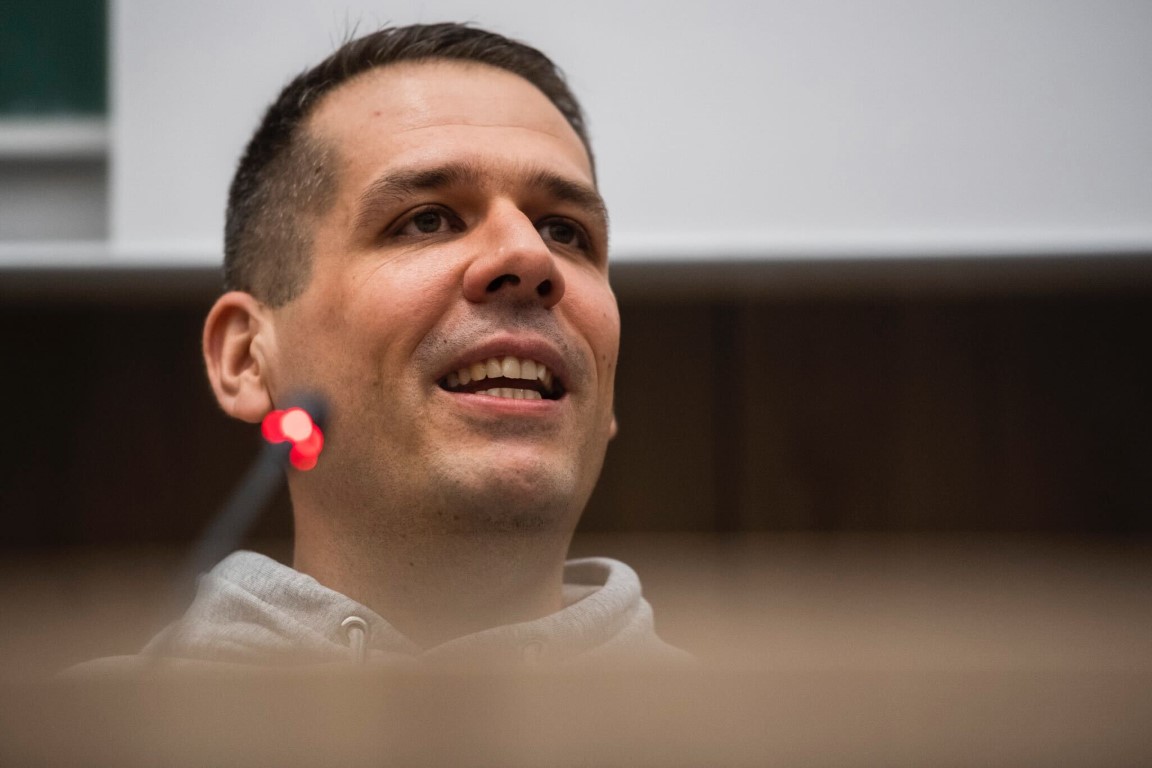
Our commitment to making a positive impact goes beyond just marketing. Ataccama actively supports various causes, such as efforts in Ukraine and Turkey. We believe in leading by example and showing our employees, especially the students, that they should replicate this mindset in their personal lives as well. We want to instill in them the idea that they can be more than just great engineers or data experts, but also individuals who can elevate society as a whole. To further this mission, we offer internships, particularly in our Bratislava office, where we invite young talents, even those who are just starting their university studies. They may not be ready to contribute immediately, but they’re full of energy and creativity. We don’t want to lose them to jobs like Uber or McDonald's, where they may just waste their time for some pocket money. We do provide them with the necessary funds for their personal needs, but we also aim to utilize their talents effectively. For instance, if someone is good at programming, we want them to learn and hone that skill, rather than just delivering food.
We start early, sometimes as early as in senior year of high school or the first year of university, because we understand that young talents may not know what they’re good at yet. We want to provide them with their first professional experience, but more importantly, we want them to be part of a team that shares the same values. My personal mission, which I’ve already presented to our CEO Michal, is to upgrade Ataccama's approach to talent acquisition. We want to do more than just gather talent; we want to nurture and develop it. We will be thrilled if, after a year or two with us, these individuals go on to contribute to the industry or the region. We want to instill in them a sense of responsibility towards society and a commitment to professionalism. While we are a for-profit company and will try to retain good talent, we will not block their opportunities elsewhere, as that goes against our promise of freedom and creating value for society.
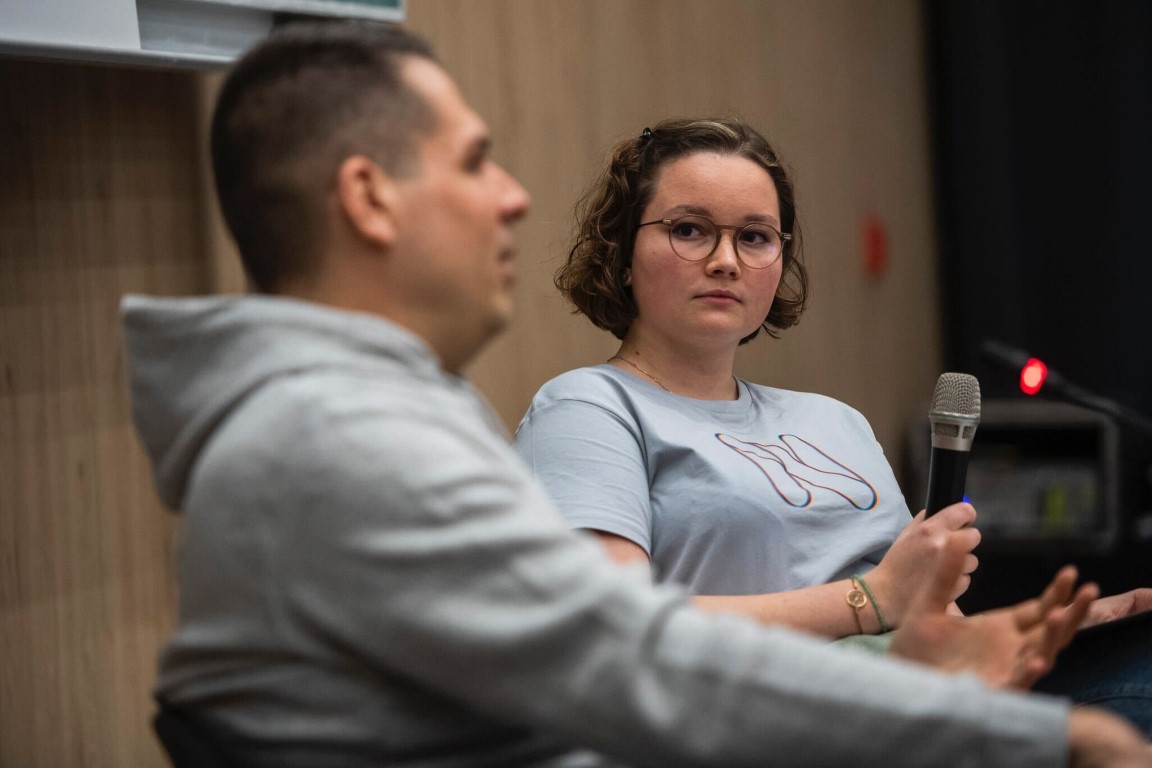
This brings me to the second part of our approach - preventing brain drain. Ataccama is not about just moving talent to our head office or other locations for the sake of it. We’re not like other corporations that rotate employees around the world without considering their personal needs or ties. Michal, our leader, has never forced anyone to move out of their home country for work. This is not the Ataccama way. We value the unique perspectives and multicultural experiences that our employees bring to the table, and we believe that removing people from their local contexts can result in a narrow worldview. We encourage a global perspective while allowing our employees to stay connected to their roots. At Ataccama, we are committed to inclusiveness, data democratization, and talent development. We believe in leading by example, showing our employees the importance of making a positive impact, and creating opportunities for growth and development. The event also helped me realize that young people and I are on the same wavelength. They often ask me for advice on starting something new, and I always tell them that they should never stop evolving. Many people of my age, and even younger, tend to resign themselves to the belief that they can't change anything - the climate, the political establishment, or preventing corruption. But that's not true. I encourage them to consider that they do have the power to make a difference - if they choose to. Giving up is always an option, but they can also try to take action.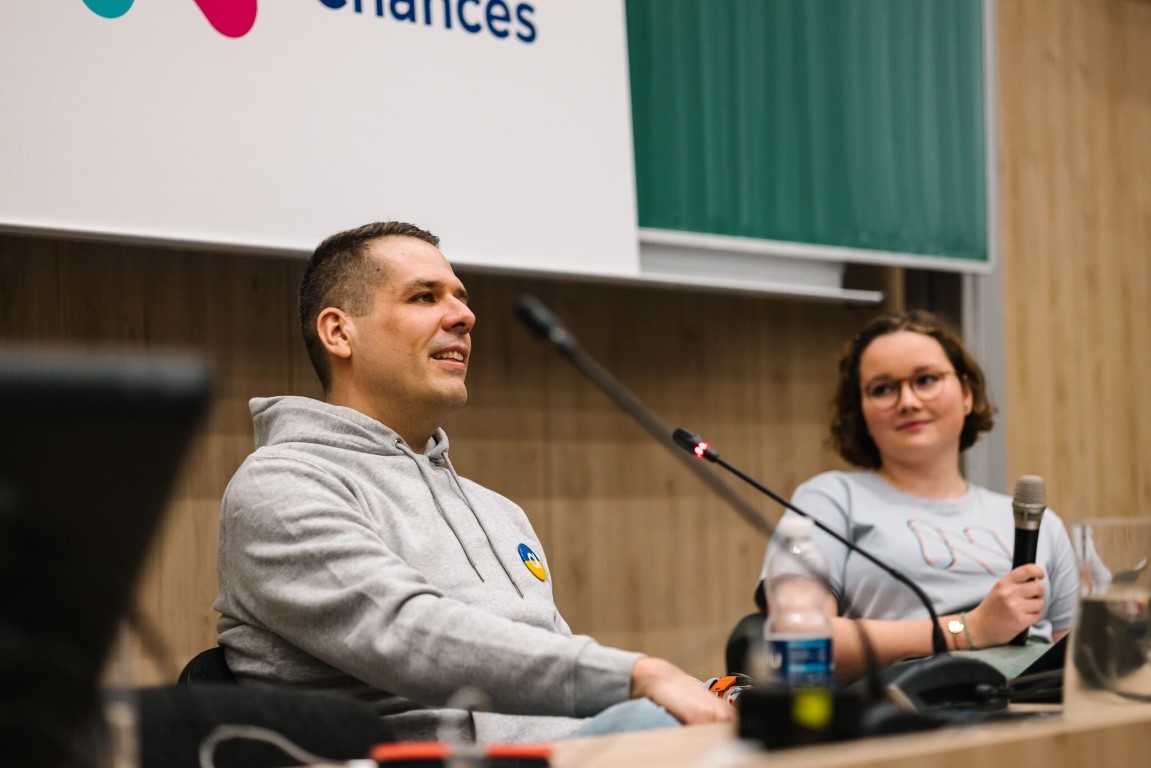
I understand that young people are often impatient and want to see results quickly, even within days or weeks. But as someone who is older and has more experience, I know that change takes time - sometimes years or even decades. They need to be patient and persistent. Evolving doesn't just mean continuously learning, such as through blogs, audiobooks, or gaining new information even after finishing their studies or becoming experts in their fields. It also means constantly working towards a goal. For example, if the goal is to combat global warming, that may not be possible on an individual level. However, making a positive impact in their neighborhood, such as reducing energy consumption in 10 houses in their area, is an achievable and worthwhile goal. Small actions can have a ripple effect, and create change in the larger web of society.
I also emphasize that they don't need to hold a high-ranking position in a global company to have the power to make a difference. In fact, anyone, regardless of their status, can have an impact. It's about being proactive, relevant, and continuously striving for change. Even if they feel like they are nobody, they can still leave their footprint and make a positive impact.I share my own experience of being good at math and physics when I was young, but not fully understanding the practical applications at that time. Now, many years later, I can see how those skills are relevant in real-world applications, such as using deep learning models like GPT for language processing. It's a reminder that learning something new is never a waste of time, even if they may not immediately see how to use it. There may be unexpected ways to apply their knowledge in the future.
In conclusion, my advice to young people is to never stop evolving - constantly learning, taking action, and making a positive impact, even if it's on a small scale. Change may take time, but it's worth it. They have the power to make a difference, and their efforts can have a lasting impact on the world.

